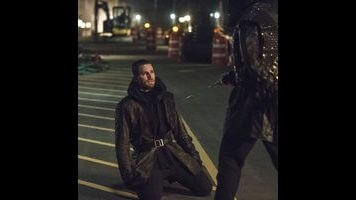Arrow has struggled throughout season three, making bold moves and all too frequently backing away from, rather than embracing, the ramifications of these series-altering decisions. “My Name Is Oliver Queen” continues this trend, ending the season with the same dramatic reveals and convenient resolutions that spurred the season’s most thrilling and frustrating moments. The energy and momentum of the finale compensate for many of its weaknesses and the episode is ultimately an entertaining one, but the experience is hollow, a far cry from the powerful and satisfying end of season two.
Rather than pick up immediately after the previous episode’s not-really-a-cliffhanger, “My Name Is Oliver Queen” opens with Oliver and Ra’s, who are on their way to destroy Starling City. The finale wastes little time reestablishing their animosity, with Oliver outing himself to Ra’s to save Nyssa, and while this is a relief, it undercuts the Nanda Parbat scheming that has fueled the past several episodes. Aside from some quickly tabled interpersonal strife on Team Arrow, it’s hard to see what point, if any, the Nanda Parbat arc served in setting up this finale.
As for the aforementioned not-really-a-cliffhanger, the solution presented is paper thin and as unsatisfying as the cliffhanger itself. Thankfully the episode quickly distracts from Merlyn’s tiresome exposition with the arrival of The Flash, who brings a much needed dose of perspective and levity. Barry’s take on the Lazarus Pit—“You guys have a hot tub? Nice”—is great, as is his chagrin when Felicity unthinkingly outs his identity to Merlyn. While these crossovers are reliably entertaining and have given both series some of their best episodes this season, the timeline between this latest Arrow and The Flash crossover is murky at best—just when did Oliver pop down to Central City to help fight Reverse Flash?—and the writers should be wary of sacrificing the integrity of one show’s narrative to give the other a boost.
Once the team is back together in Starling City, the finale becomes a fairly straightforward race against the clock. The foregrounding of Damien Darhk is undoubtedly a tease for season four and while the set piece at the hotel could easily feel like a distraction, it works as an opportunity to show Oliver, Diggle, Nyssa, and Merlyn working in tandem. It’s a nice counterpoint to the rest of the action, which spreads the cast across the city, cutting back and forth between each pairing as they attempt to contain the virus. Arrow uses this approach frequently and this sequence is another example of the series’ careful editing, building momentum throughout while giving the audience a firm grasp of the big picture.
Unfortunately the climax of the finale, the duel between Ra’s and Oliver, is disappointing. Instead of a new skill or weapon, Ollie overcomes because he has something to live for: his love of Felicity. This may work for the ’shippers, but to this cold-hearted viewer, it feels like a cop-out. The duel itself lacks energy, as the stakes have been set so high that the resolution is assured. Thankfully, Felicity contributes to the duel by doing more than loving her man and when she flies in to save Ollie, it’s one of the finale’s most triumphant moments. Just as thrilling is the introduction of Thea as Speedy—sorry Thea, no way Red Arrow’s catching on—and later, her immediate acceptance into the group. At long last, Oliver is done telling the women in his life what they’re allowed to be.
As the action dies down, the denouement brings the season’s weakest threads back to the fore. Diggle and Oliver’s goodbye is far too cordial. Oliver kidnapped his wife and left his infant unsupervised in his home. That’s unforgiveable, but the series would like the audience to accept Diggle’s punching of Oliver as a healthy first step towards reconciliation. This pales in comparison, of course, to the utter mismanagement of Thea and Merlyn’s relationship. Merlyn drugged Thea into murdering a friend. There is no amount of good that can undo that, there is no way to balance that scale. And yet the series is too in love with Merlyn as a character to commit to what the consequences of his actions must logically be. Thea’s, “you’ve made good by that promise” is infuriating. Had Merlyn ended the season reviving Sara as his first act as the new Ra’s, the conversation may have played differently. As it is, the good work done with Thea and Laurel over the course of the season remains tarnished by the writers’ decision to make Oliver the character most upset with Merlyn over Sara’s death.
Oliver may end the season driving off with Felicity for a belated honeymoon—Felicity seems to be the only person concerned that he’s still married to Nyssa—but his retirement will certainly be short-lived. Felicity’s instant forgiveness of Oliver is irritating, turning her into a prize for him after his season of toil, but it’s in-character for her, given her actions this season. Her scenes in the finale are instantly helped by the simple fact that she doesn’t cry and with the Olicity season of angst finally over and Palmer Industries headed her way, there should be more interesting storylines in Felicity’s future. Despite its significant problems, season three of Arrow has done important work building up several of its supporting characters and with a deeper bench to draw from, a new villain, and a fresh start for Oliver, season four will hopefully bring the show back to its late-season-two heights.
Stray observations:
- Who puts only one emergency parachute on a plane that size? And if Oliver and Nyssa need a reason not to jump out after Ra’s, how about because they don’t want their massive plane to crash into the middle of a city?
- Also in eye-rolling contrivances, whatever establishment Tatsu used to cremate Akio must be efficient, if General Shrieve’s men didn’t find him in the time it took to say goodbye and send the body for cremation. Aside from that nitpick, however, these are some of my favorite flashbacks of the season. They work very well to give a sense of closure to the season and it’s nice to spend one more episode with Maseo.
- Paul Blackthorne has done great work all season and he’s very good here, lending gravitas to his few scenes and selling Captain Lance’s return to tentative Team Arrow ally.
- Ray Palmer has been a delight and it’s wonderful to see Brandon Routh used so well in such a significant role. His goofiness is perfect for the character and he’s a major asset to the upcoming Legends Of Tomorrow spin-off. If I hadn’t known about the spin-off however, I would’ve been very upset about the Palmer Industries explosion.









































